LAW8500 Commercial Law: Case Study on Trust, Liability Issues
VerifiedAdded on 2023/06/11
|7
|2371
|364
Case Study
AI Summary
This assignment presents a case study analyzing two key commercial law issues: the certainty of trust creation and company liability. The first issue explores whether a valid express trust was created when Basil declared himself trustee of 5% of his company's shares, focusing on the three certainties (intention, subject matter, and object). The analysis concludes that no express trust was formed due to a lack of certainty of intention, as Basil's conduct did not align with his words. The second issue examines whether a company is liable to pay an architect based on a deal made by Tina, a de facto managing director. Applying principles of agency law, the analysis determines that the company is liable due to Tina's ostensible authority, as the architect reasonably assumed she had the authority to act on behalf of the company. Desklib offers a wealth of similar solved assignments and study materials for students.
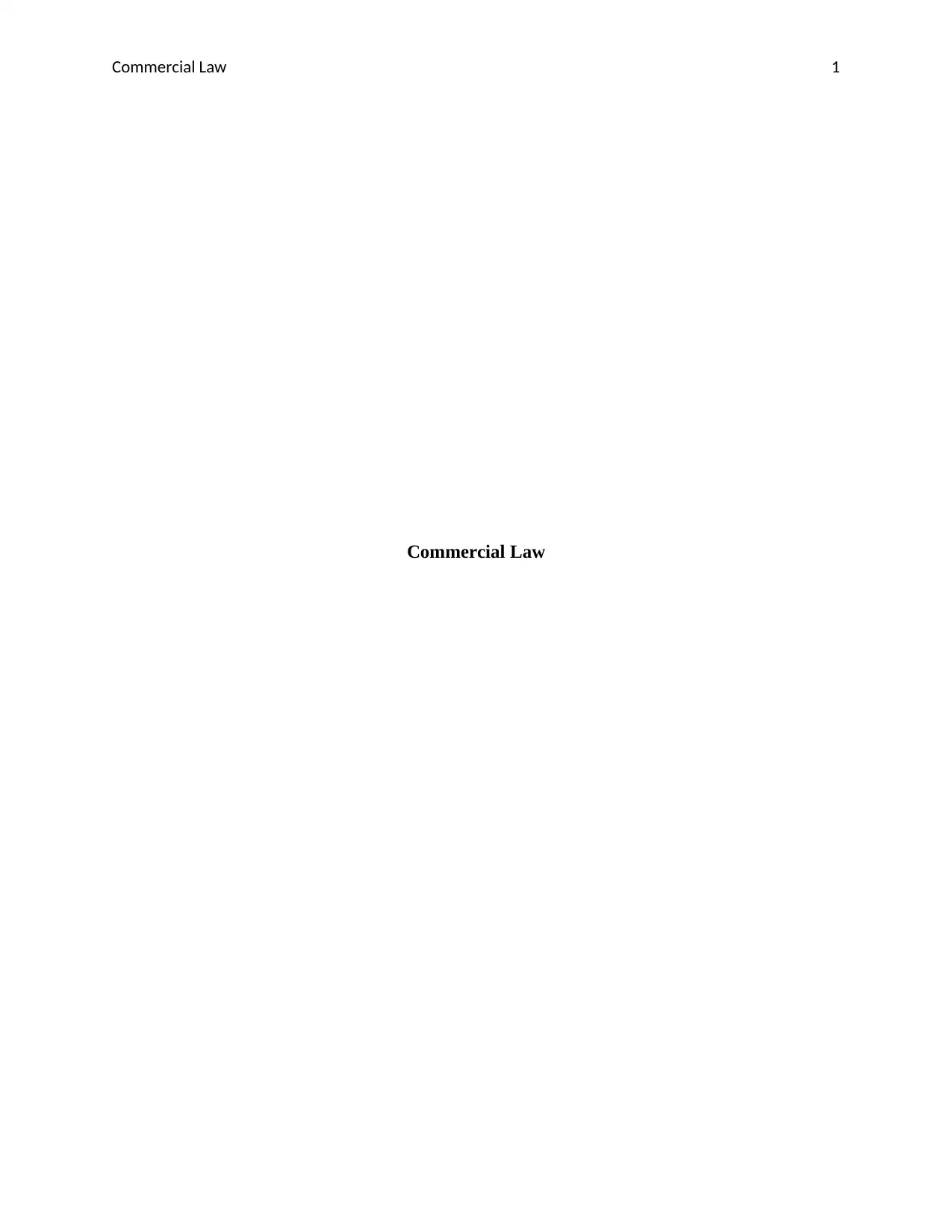
Commercial Law 1
Commercial Law
Commercial Law
Paraphrase This Document
Need a fresh take? Get an instant paraphrase of this document with our AI Paraphraser
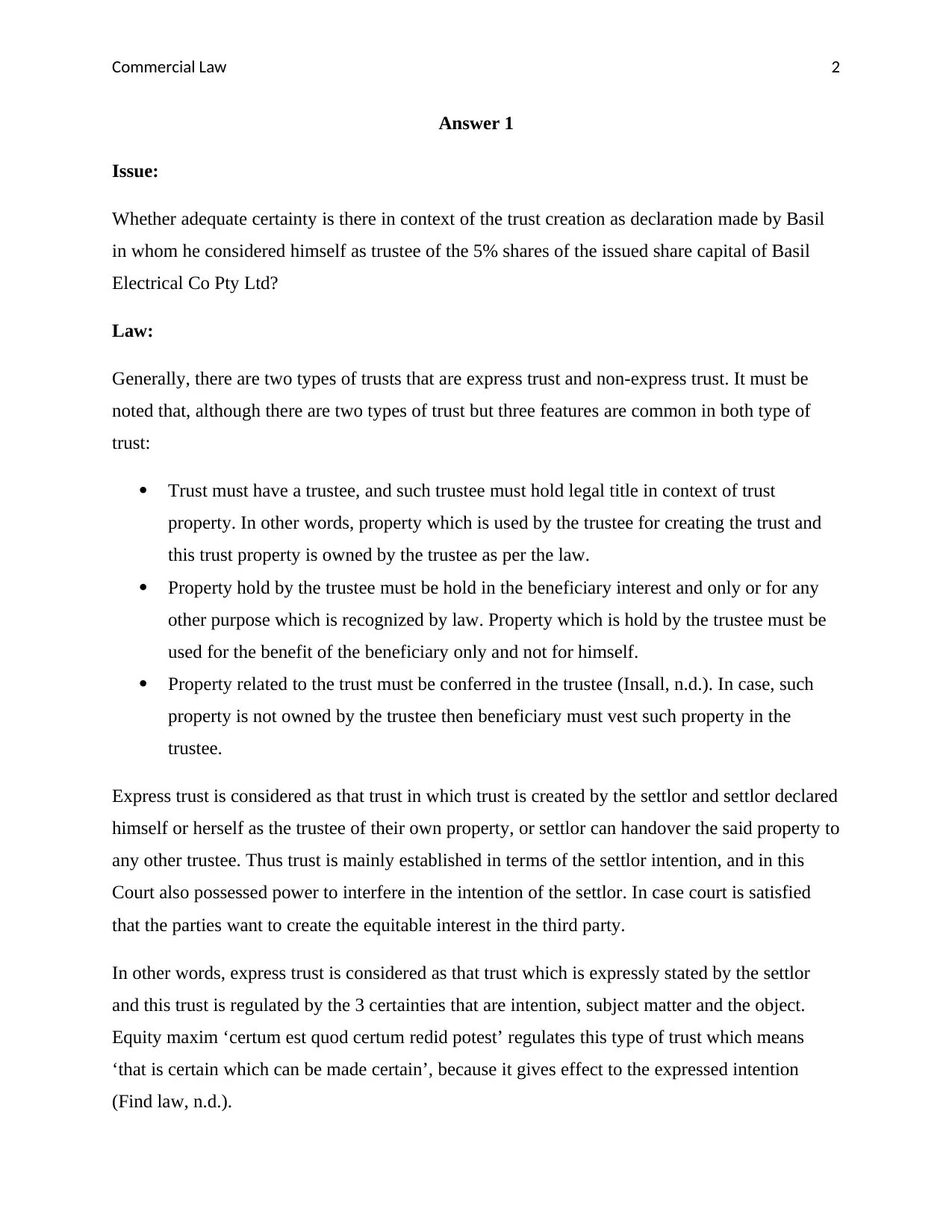
Commercial Law 2
Answer 1
Issue:
Whether adequate certainty is there in context of the trust creation as declaration made by Basil
in whom he considered himself as trustee of the 5% shares of the issued share capital of Basil
Electrical Co Pty Ltd?
Law:
Generally, there are two types of trusts that are express trust and non-express trust. It must be
noted that, although there are two types of trust but three features are common in both type of
trust:
Trust must have a trustee, and such trustee must hold legal title in context of trust
property. In other words, property which is used by the trustee for creating the trust and
this trust property is owned by the trustee as per the law.
Property hold by the trustee must be hold in the beneficiary interest and only or for any
other purpose which is recognized by law. Property which is hold by the trustee must be
used for the benefit of the beneficiary only and not for himself.
Property related to the trust must be conferred in the trustee (Insall, n.d.). In case, such
property is not owned by the trustee then beneficiary must vest such property in the
trustee.
Express trust is considered as that trust in which trust is created by the settlor and settlor declared
himself or herself as the trustee of their own property, or settlor can handover the said property to
any other trustee. Thus trust is mainly established in terms of the settlor intention, and in this
Court also possessed power to interfere in the intention of the settlor. In case court is satisfied
that the parties want to create the equitable interest in the third party.
In other words, express trust is considered as that trust which is expressly stated by the settlor
and this trust is regulated by the 3 certainties that are intention, subject matter and the object.
Equity maxim ‘certum est quod certum redid potest’ regulates this type of trust which means
‘that is certain which can be made certain’, because it gives effect to the expressed intention
(Find law, n.d.).
Answer 1
Issue:
Whether adequate certainty is there in context of the trust creation as declaration made by Basil
in whom he considered himself as trustee of the 5% shares of the issued share capital of Basil
Electrical Co Pty Ltd?
Law:
Generally, there are two types of trusts that are express trust and non-express trust. It must be
noted that, although there are two types of trust but three features are common in both type of
trust:
Trust must have a trustee, and such trustee must hold legal title in context of trust
property. In other words, property which is used by the trustee for creating the trust and
this trust property is owned by the trustee as per the law.
Property hold by the trustee must be hold in the beneficiary interest and only or for any
other purpose which is recognized by law. Property which is hold by the trustee must be
used for the benefit of the beneficiary only and not for himself.
Property related to the trust must be conferred in the trustee (Insall, n.d.). In case, such
property is not owned by the trustee then beneficiary must vest such property in the
trustee.
Express trust is considered as that trust in which trust is created by the settlor and settlor declared
himself or herself as the trustee of their own property, or settlor can handover the said property to
any other trustee. Thus trust is mainly established in terms of the settlor intention, and in this
Court also possessed power to interfere in the intention of the settlor. In case court is satisfied
that the parties want to create the equitable interest in the third party.
In other words, express trust is considered as that trust which is expressly stated by the settlor
and this trust is regulated by the 3 certainties that are intention, subject matter and the object.
Equity maxim ‘certum est quod certum redid potest’ regulates this type of trust which means
‘that is certain which can be made certain’, because it gives effect to the expressed intention
(Find law, n.d.).
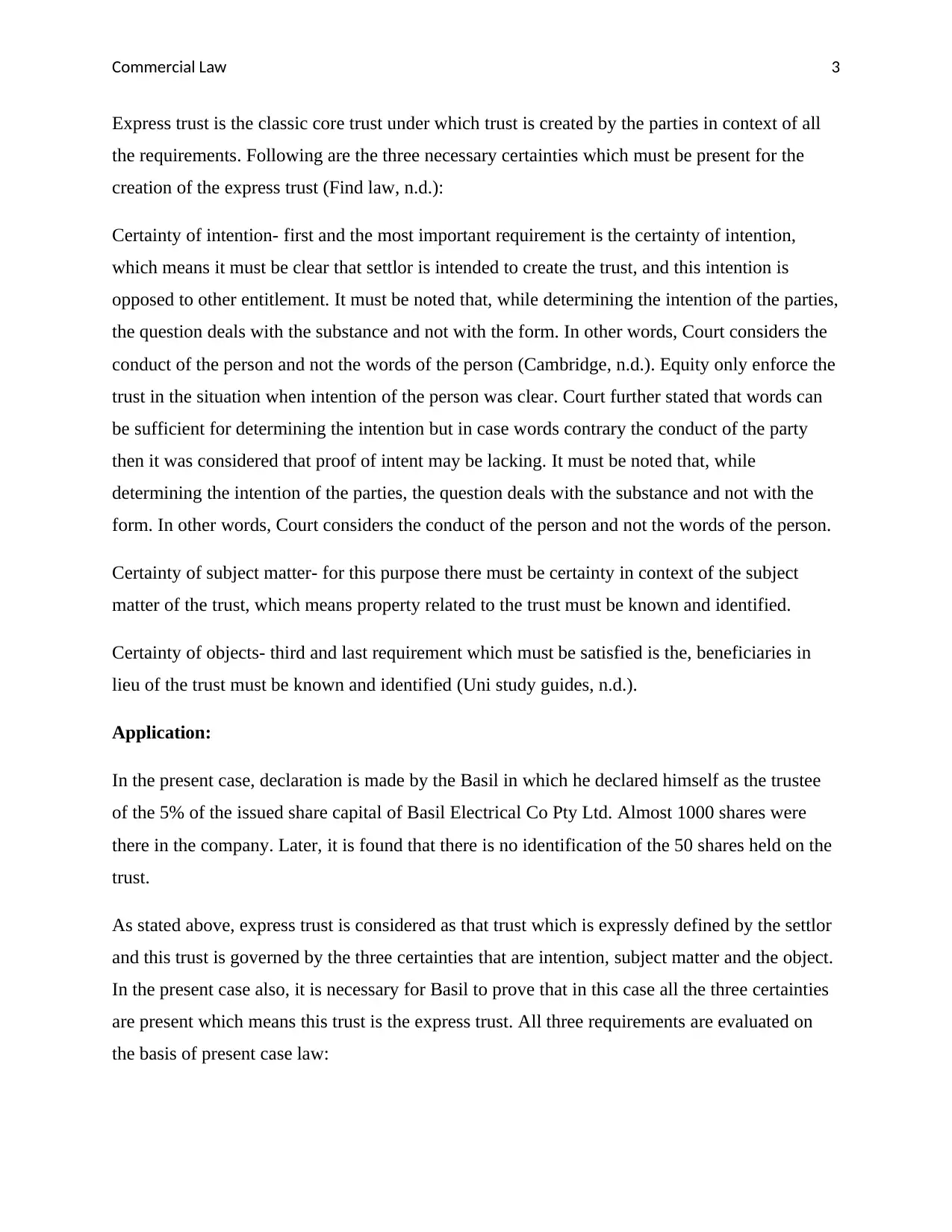
Commercial Law 3
Express trust is the classic core trust under which trust is created by the parties in context of all
the requirements. Following are the three necessary certainties which must be present for the
creation of the express trust (Find law, n.d.):
Certainty of intention- first and the most important requirement is the certainty of intention,
which means it must be clear that settlor is intended to create the trust, and this intention is
opposed to other entitlement. It must be noted that, while determining the intention of the parties,
the question deals with the substance and not with the form. In other words, Court considers the
conduct of the person and not the words of the person (Cambridge, n.d.). Equity only enforce the
trust in the situation when intention of the person was clear. Court further stated that words can
be sufficient for determining the intention but in case words contrary the conduct of the party
then it was considered that proof of intent may be lacking. It must be noted that, while
determining the intention of the parties, the question deals with the substance and not with the
form. In other words, Court considers the conduct of the person and not the words of the person.
Certainty of subject matter- for this purpose there must be certainty in context of the subject
matter of the trust, which means property related to the trust must be known and identified.
Certainty of objects- third and last requirement which must be satisfied is the, beneficiaries in
lieu of the trust must be known and identified (Uni study guides, n.d.).
Application:
In the present case, declaration is made by the Basil in which he declared himself as the trustee
of the 5% of the issued share capital of Basil Electrical Co Pty Ltd. Almost 1000 shares were
there in the company. Later, it is found that there is no identification of the 50 shares held on the
trust.
As stated above, express trust is considered as that trust which is expressly defined by the settlor
and this trust is governed by the three certainties that are intention, subject matter and the object.
In the present case also, it is necessary for Basil to prove that in this case all the three certainties
are present which means this trust is the express trust. All three requirements are evaluated on
the basis of present case law:
Express trust is the classic core trust under which trust is created by the parties in context of all
the requirements. Following are the three necessary certainties which must be present for the
creation of the express trust (Find law, n.d.):
Certainty of intention- first and the most important requirement is the certainty of intention,
which means it must be clear that settlor is intended to create the trust, and this intention is
opposed to other entitlement. It must be noted that, while determining the intention of the parties,
the question deals with the substance and not with the form. In other words, Court considers the
conduct of the person and not the words of the person (Cambridge, n.d.). Equity only enforce the
trust in the situation when intention of the person was clear. Court further stated that words can
be sufficient for determining the intention but in case words contrary the conduct of the party
then it was considered that proof of intent may be lacking. It must be noted that, while
determining the intention of the parties, the question deals with the substance and not with the
form. In other words, Court considers the conduct of the person and not the words of the person.
Certainty of subject matter- for this purpose there must be certainty in context of the subject
matter of the trust, which means property related to the trust must be known and identified.
Certainty of objects- third and last requirement which must be satisfied is the, beneficiaries in
lieu of the trust must be known and identified (Uni study guides, n.d.).
Application:
In the present case, declaration is made by the Basil in which he declared himself as the trustee
of the 5% of the issued share capital of Basil Electrical Co Pty Ltd. Almost 1000 shares were
there in the company. Later, it is found that there is no identification of the 50 shares held on the
trust.
As stated above, express trust is considered as that trust which is expressly defined by the settlor
and this trust is governed by the three certainties that are intention, subject matter and the object.
In the present case also, it is necessary for Basil to prove that in this case all the three certainties
are present which means this trust is the express trust. All three requirements are evaluated on
the basis of present case law:
⊘ This is a preview!⊘
Do you want full access?
Subscribe today to unlock all pages.

Trusted by 1+ million students worldwide
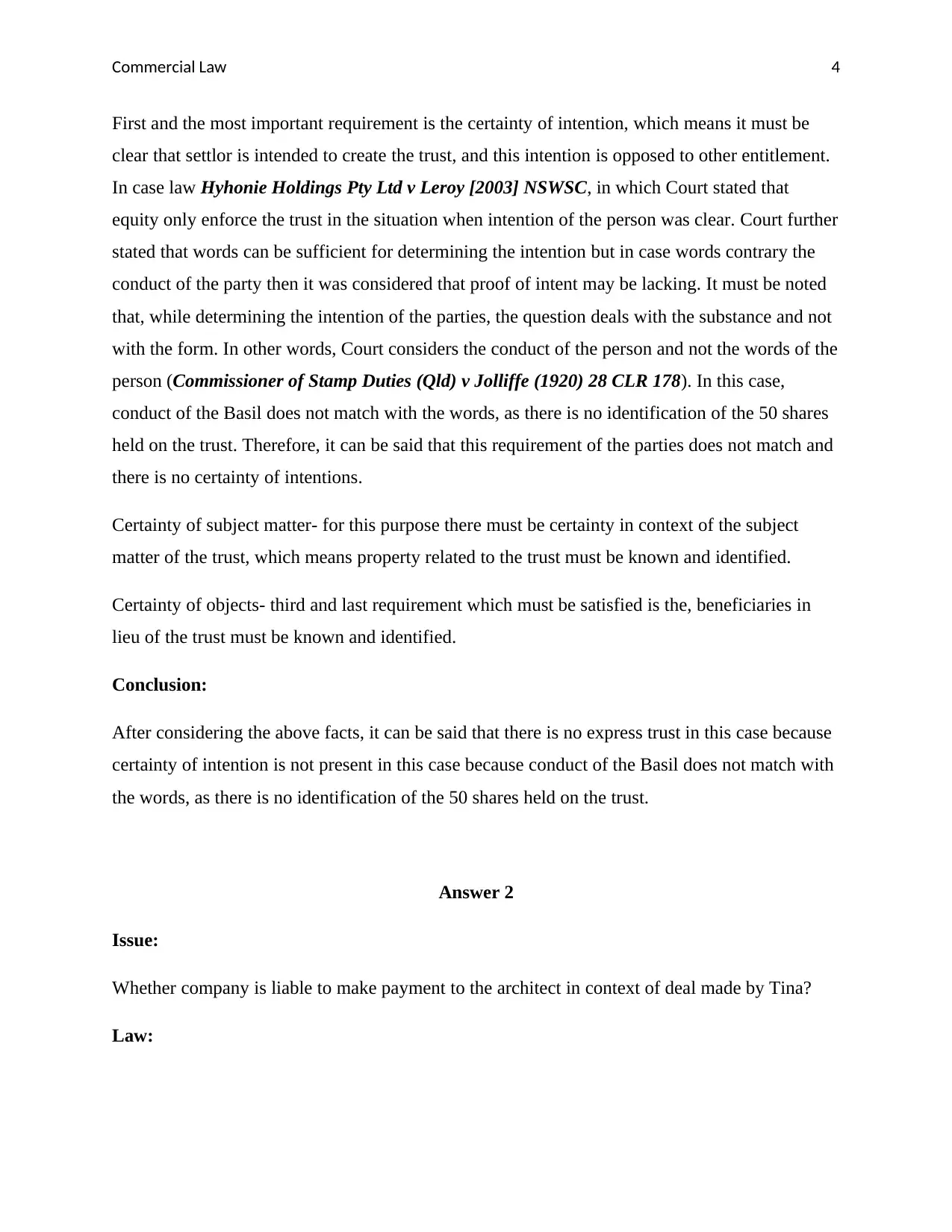
Commercial Law 4
First and the most important requirement is the certainty of intention, which means it must be
clear that settlor is intended to create the trust, and this intention is opposed to other entitlement.
In case law Hyhonie Holdings Pty Ltd v Leroy [2003] NSWSC, in which Court stated that
equity only enforce the trust in the situation when intention of the person was clear. Court further
stated that words can be sufficient for determining the intention but in case words contrary the
conduct of the party then it was considered that proof of intent may be lacking. It must be noted
that, while determining the intention of the parties, the question deals with the substance and not
with the form. In other words, Court considers the conduct of the person and not the words of the
person (Commissioner of Stamp Duties (Qld) v Jolliffe (1920) 28 CLR 178). In this case,
conduct of the Basil does not match with the words, as there is no identification of the 50 shares
held on the trust. Therefore, it can be said that this requirement of the parties does not match and
there is no certainty of intentions.
Certainty of subject matter- for this purpose there must be certainty in context of the subject
matter of the trust, which means property related to the trust must be known and identified.
Certainty of objects- third and last requirement which must be satisfied is the, beneficiaries in
lieu of the trust must be known and identified.
Conclusion:
After considering the above facts, it can be said that there is no express trust in this case because
certainty of intention is not present in this case because conduct of the Basil does not match with
the words, as there is no identification of the 50 shares held on the trust.
Answer 2
Issue:
Whether company is liable to make payment to the architect in context of deal made by Tina?
Law:
First and the most important requirement is the certainty of intention, which means it must be
clear that settlor is intended to create the trust, and this intention is opposed to other entitlement.
In case law Hyhonie Holdings Pty Ltd v Leroy [2003] NSWSC, in which Court stated that
equity only enforce the trust in the situation when intention of the person was clear. Court further
stated that words can be sufficient for determining the intention but in case words contrary the
conduct of the party then it was considered that proof of intent may be lacking. It must be noted
that, while determining the intention of the parties, the question deals with the substance and not
with the form. In other words, Court considers the conduct of the person and not the words of the
person (Commissioner of Stamp Duties (Qld) v Jolliffe (1920) 28 CLR 178). In this case,
conduct of the Basil does not match with the words, as there is no identification of the 50 shares
held on the trust. Therefore, it can be said that this requirement of the parties does not match and
there is no certainty of intentions.
Certainty of subject matter- for this purpose there must be certainty in context of the subject
matter of the trust, which means property related to the trust must be known and identified.
Certainty of objects- third and last requirement which must be satisfied is the, beneficiaries in
lieu of the trust must be known and identified.
Conclusion:
After considering the above facts, it can be said that there is no express trust in this case because
certainty of intention is not present in this case because conduct of the Basil does not match with
the words, as there is no identification of the 50 shares held on the trust.
Answer 2
Issue:
Whether company is liable to make payment to the architect in context of deal made by Tina?
Law:
Paraphrase This Document
Need a fresh take? Get an instant paraphrase of this document with our AI Paraphraser
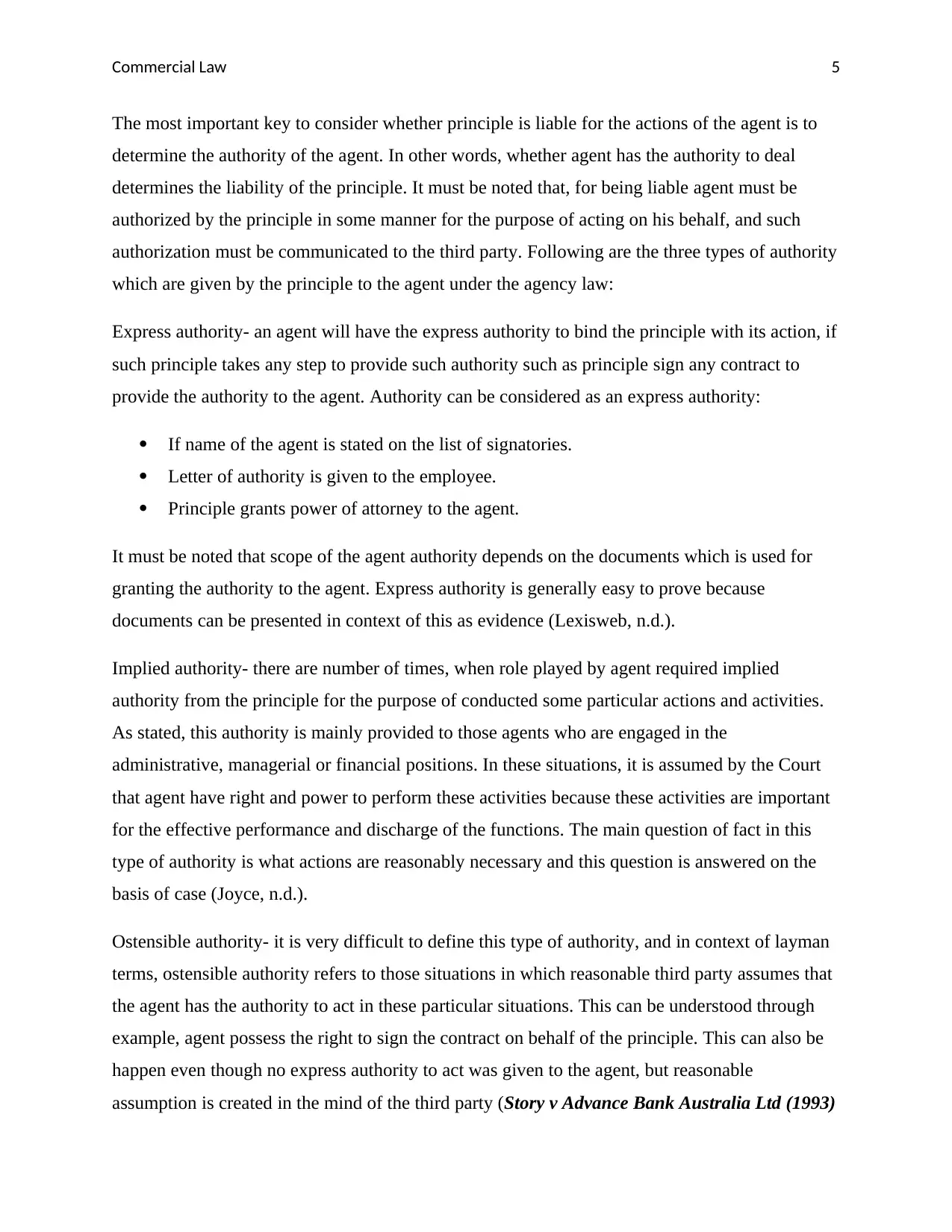
Commercial Law 5
The most important key to consider whether principle is liable for the actions of the agent is to
determine the authority of the agent. In other words, whether agent has the authority to deal
determines the liability of the principle. It must be noted that, for being liable agent must be
authorized by the principle in some manner for the purpose of acting on his behalf, and such
authorization must be communicated to the third party. Following are the three types of authority
which are given by the principle to the agent under the agency law:
Express authority- an agent will have the express authority to bind the principle with its action, if
such principle takes any step to provide such authority such as principle sign any contract to
provide the authority to the agent. Authority can be considered as an express authority:
If name of the agent is stated on the list of signatories.
Letter of authority is given to the employee.
Principle grants power of attorney to the agent.
It must be noted that scope of the agent authority depends on the documents which is used for
granting the authority to the agent. Express authority is generally easy to prove because
documents can be presented in context of this as evidence (Lexisweb, n.d.).
Implied authority- there are number of times, when role played by agent required implied
authority from the principle for the purpose of conducted some particular actions and activities.
As stated, this authority is mainly provided to those agents who are engaged in the
administrative, managerial or financial positions. In these situations, it is assumed by the Court
that agent have right and power to perform these activities because these activities are important
for the effective performance and discharge of the functions. The main question of fact in this
type of authority is what actions are reasonably necessary and this question is answered on the
basis of case (Joyce, n.d.).
Ostensible authority- it is very difficult to define this type of authority, and in context of layman
terms, ostensible authority refers to those situations in which reasonable third party assumes that
the agent has the authority to act in these particular situations. This can be understood through
example, agent possess the right to sign the contract on behalf of the principle. This can also be
happen even though no express authority to act was given to the agent, but reasonable
assumption is created in the mind of the third party (Story v Advance Bank Australia Ltd (1993)
The most important key to consider whether principle is liable for the actions of the agent is to
determine the authority of the agent. In other words, whether agent has the authority to deal
determines the liability of the principle. It must be noted that, for being liable agent must be
authorized by the principle in some manner for the purpose of acting on his behalf, and such
authorization must be communicated to the third party. Following are the three types of authority
which are given by the principle to the agent under the agency law:
Express authority- an agent will have the express authority to bind the principle with its action, if
such principle takes any step to provide such authority such as principle sign any contract to
provide the authority to the agent. Authority can be considered as an express authority:
If name of the agent is stated on the list of signatories.
Letter of authority is given to the employee.
Principle grants power of attorney to the agent.
It must be noted that scope of the agent authority depends on the documents which is used for
granting the authority to the agent. Express authority is generally easy to prove because
documents can be presented in context of this as evidence (Lexisweb, n.d.).
Implied authority- there are number of times, when role played by agent required implied
authority from the principle for the purpose of conducted some particular actions and activities.
As stated, this authority is mainly provided to those agents who are engaged in the
administrative, managerial or financial positions. In these situations, it is assumed by the Court
that agent have right and power to perform these activities because these activities are important
for the effective performance and discharge of the functions. The main question of fact in this
type of authority is what actions are reasonably necessary and this question is answered on the
basis of case (Joyce, n.d.).
Ostensible authority- it is very difficult to define this type of authority, and in context of layman
terms, ostensible authority refers to those situations in which reasonable third party assumes that
the agent has the authority to act in these particular situations. This can be understood through
example, agent possess the right to sign the contract on behalf of the principle. This can also be
happen even though no express authority to act was given to the agent, but reasonable
assumption is created in the mind of the third party (Story v Advance Bank Australia Ltd (1993)
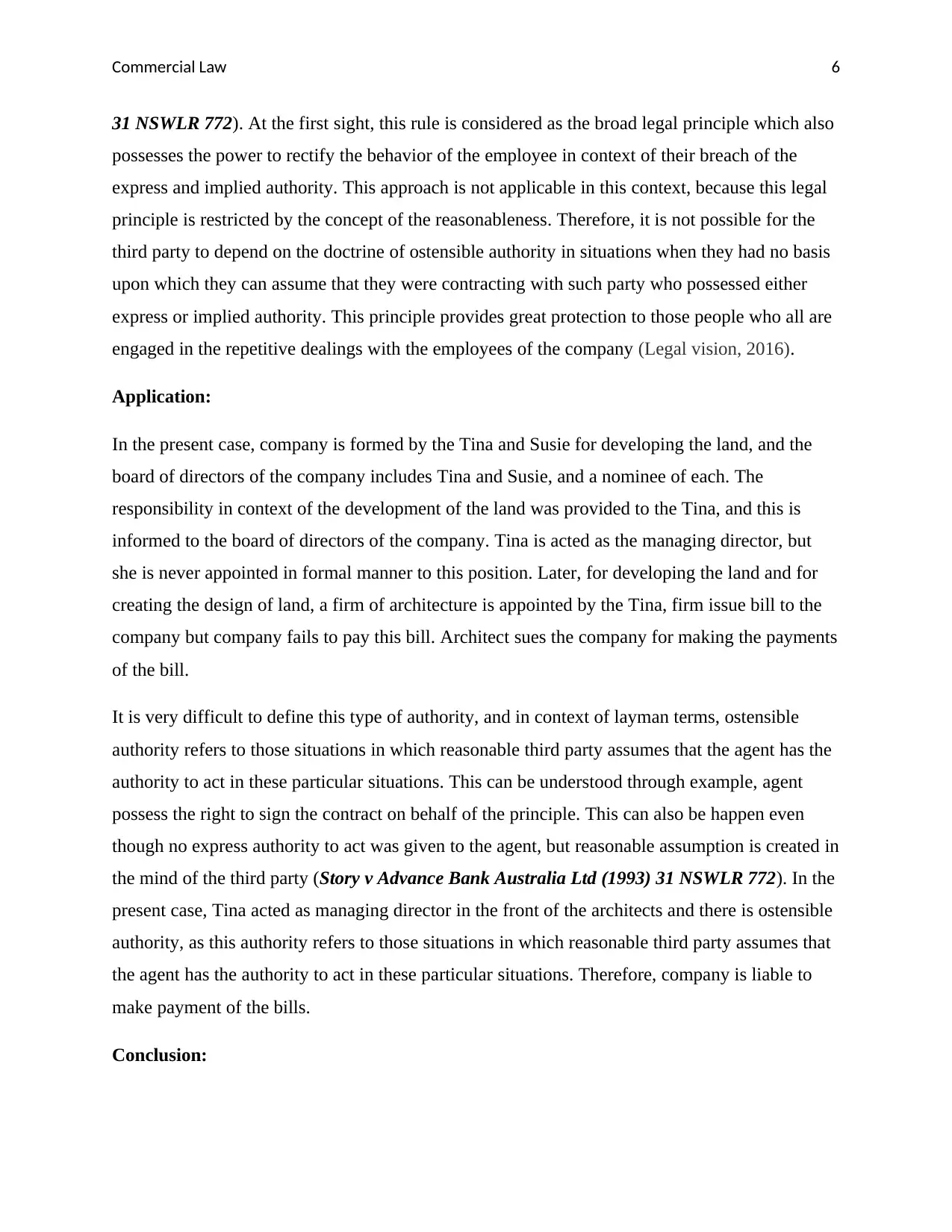
Commercial Law 6
31 NSWLR 772). At the first sight, this rule is considered as the broad legal principle which also
possesses the power to rectify the behavior of the employee in context of their breach of the
express and implied authority. This approach is not applicable in this context, because this legal
principle is restricted by the concept of the reasonableness. Therefore, it is not possible for the
third party to depend on the doctrine of ostensible authority in situations when they had no basis
upon which they can assume that they were contracting with such party who possessed either
express or implied authority. This principle provides great protection to those people who all are
engaged in the repetitive dealings with the employees of the company (Legal vision, 2016).
Application:
In the present case, company is formed by the Tina and Susie for developing the land, and the
board of directors of the company includes Tina and Susie, and a nominee of each. The
responsibility in context of the development of the land was provided to the Tina, and this is
informed to the board of directors of the company. Tina is acted as the managing director, but
she is never appointed in formal manner to this position. Later, for developing the land and for
creating the design of land, a firm of architecture is appointed by the Tina, firm issue bill to the
company but company fails to pay this bill. Architect sues the company for making the payments
of the bill.
It is very difficult to define this type of authority, and in context of layman terms, ostensible
authority refers to those situations in which reasonable third party assumes that the agent has the
authority to act in these particular situations. This can be understood through example, agent
possess the right to sign the contract on behalf of the principle. This can also be happen even
though no express authority to act was given to the agent, but reasonable assumption is created in
the mind of the third party (Story v Advance Bank Australia Ltd (1993) 31 NSWLR 772). In the
present case, Tina acted as managing director in the front of the architects and there is ostensible
authority, as this authority refers to those situations in which reasonable third party assumes that
the agent has the authority to act in these particular situations. Therefore, company is liable to
make payment of the bills.
Conclusion:
31 NSWLR 772). At the first sight, this rule is considered as the broad legal principle which also
possesses the power to rectify the behavior of the employee in context of their breach of the
express and implied authority. This approach is not applicable in this context, because this legal
principle is restricted by the concept of the reasonableness. Therefore, it is not possible for the
third party to depend on the doctrine of ostensible authority in situations when they had no basis
upon which they can assume that they were contracting with such party who possessed either
express or implied authority. This principle provides great protection to those people who all are
engaged in the repetitive dealings with the employees of the company (Legal vision, 2016).
Application:
In the present case, company is formed by the Tina and Susie for developing the land, and the
board of directors of the company includes Tina and Susie, and a nominee of each. The
responsibility in context of the development of the land was provided to the Tina, and this is
informed to the board of directors of the company. Tina is acted as the managing director, but
she is never appointed in formal manner to this position. Later, for developing the land and for
creating the design of land, a firm of architecture is appointed by the Tina, firm issue bill to the
company but company fails to pay this bill. Architect sues the company for making the payments
of the bill.
It is very difficult to define this type of authority, and in context of layman terms, ostensible
authority refers to those situations in which reasonable third party assumes that the agent has the
authority to act in these particular situations. This can be understood through example, agent
possess the right to sign the contract on behalf of the principle. This can also be happen even
though no express authority to act was given to the agent, but reasonable assumption is created in
the mind of the third party (Story v Advance Bank Australia Ltd (1993) 31 NSWLR 772). In the
present case, Tina acted as managing director in the front of the architects and there is ostensible
authority, as this authority refers to those situations in which reasonable third party assumes that
the agent has the authority to act in these particular situations. Therefore, company is liable to
make payment of the bills.
Conclusion:
⊘ This is a preview!⊘
Do you want full access?
Subscribe today to unlock all pages.

Trusted by 1+ million students worldwide
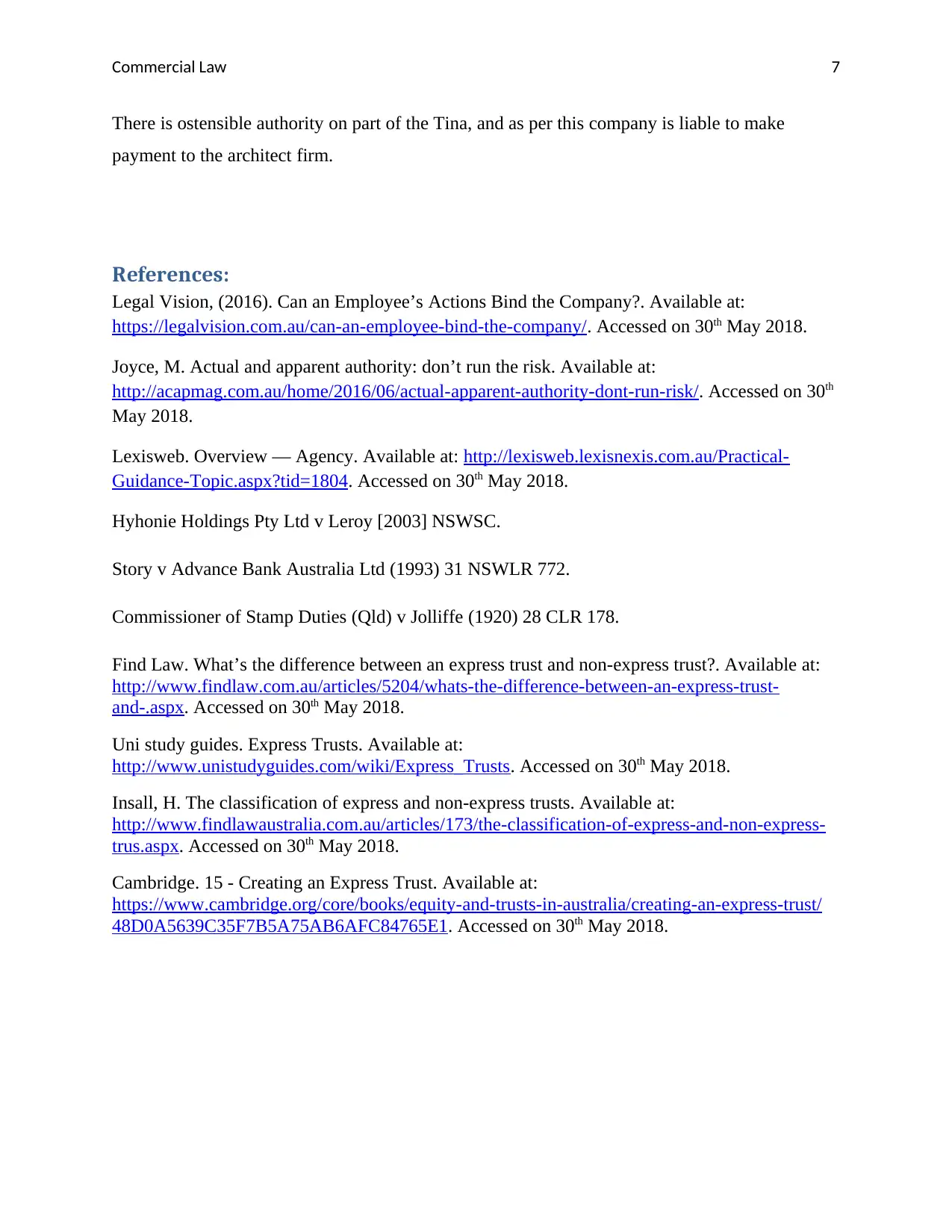
Commercial Law 7
There is ostensible authority on part of the Tina, and as per this company is liable to make
payment to the architect firm.
References:
Legal Vision, (2016). Can an Employee’s Actions Bind the Company?. Available at:
https://legalvision.com.au/can-an-employee-bind-the-company/. Accessed on 30th May 2018.
Joyce, M. Actual and apparent authority: don’t run the risk. Available at:
http://acapmag.com.au/home/2016/06/actual-apparent-authority-dont-run-risk/. Accessed on 30th
May 2018.
Lexisweb. Overview — Agency. Available at: http://lexisweb.lexisnexis.com.au/Practical-
Guidance-Topic.aspx?tid=1804. Accessed on 30th May 2018.
Hyhonie Holdings Pty Ltd v Leroy [2003] NSWSC.
Story v Advance Bank Australia Ltd (1993) 31 NSWLR 772.
Commissioner of Stamp Duties (Qld) v Jolliffe (1920) 28 CLR 178.
Find Law. What’s the difference between an express trust and non-express trust?. Available at:
http://www.findlaw.com.au/articles/5204/whats-the-difference-between-an-express-trust-
and-.aspx. Accessed on 30th May 2018.
Uni study guides. Express Trusts. Available at:
http://www.unistudyguides.com/wiki/Express_Trusts. Accessed on 30th May 2018.
Insall, H. The classification of express and non-express trusts. Available at:
http://www.findlawaustralia.com.au/articles/173/the-classification-of-express-and-non-express-
trus.aspx. Accessed on 30th May 2018.
Cambridge. 15 - Creating an Express Trust. Available at:
https://www.cambridge.org/core/books/equity-and-trusts-in-australia/creating-an-express-trust/
48D0A5639C35F7B5A75AB6AFC84765E1. Accessed on 30th May 2018.
There is ostensible authority on part of the Tina, and as per this company is liable to make
payment to the architect firm.
References:
Legal Vision, (2016). Can an Employee’s Actions Bind the Company?. Available at:
https://legalvision.com.au/can-an-employee-bind-the-company/. Accessed on 30th May 2018.
Joyce, M. Actual and apparent authority: don’t run the risk. Available at:
http://acapmag.com.au/home/2016/06/actual-apparent-authority-dont-run-risk/. Accessed on 30th
May 2018.
Lexisweb. Overview — Agency. Available at: http://lexisweb.lexisnexis.com.au/Practical-
Guidance-Topic.aspx?tid=1804. Accessed on 30th May 2018.
Hyhonie Holdings Pty Ltd v Leroy [2003] NSWSC.
Story v Advance Bank Australia Ltd (1993) 31 NSWLR 772.
Commissioner of Stamp Duties (Qld) v Jolliffe (1920) 28 CLR 178.
Find Law. What’s the difference between an express trust and non-express trust?. Available at:
http://www.findlaw.com.au/articles/5204/whats-the-difference-between-an-express-trust-
and-.aspx. Accessed on 30th May 2018.
Uni study guides. Express Trusts. Available at:
http://www.unistudyguides.com/wiki/Express_Trusts. Accessed on 30th May 2018.
Insall, H. The classification of express and non-express trusts. Available at:
http://www.findlawaustralia.com.au/articles/173/the-classification-of-express-and-non-express-
trus.aspx. Accessed on 30th May 2018.
Cambridge. 15 - Creating an Express Trust. Available at:
https://www.cambridge.org/core/books/equity-and-trusts-in-australia/creating-an-express-trust/
48D0A5639C35F7B5A75AB6AFC84765E1. Accessed on 30th May 2018.
1 out of 7
Related Documents
Your All-in-One AI-Powered Toolkit for Academic Success.
+13062052269
info@desklib.com
Available 24*7 on WhatsApp / Email
![[object Object]](/_next/static/media/star-bottom.7253800d.svg)
Unlock your academic potential
Copyright © 2020–2026 A2Z Services. All Rights Reserved. Developed and managed by ZUCOL.




